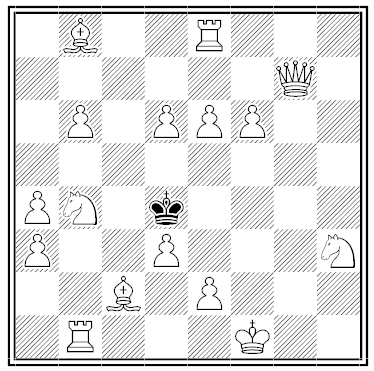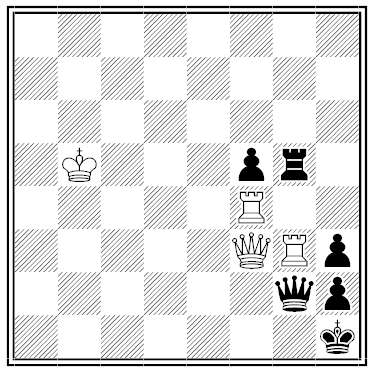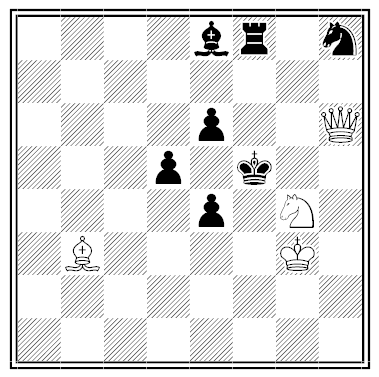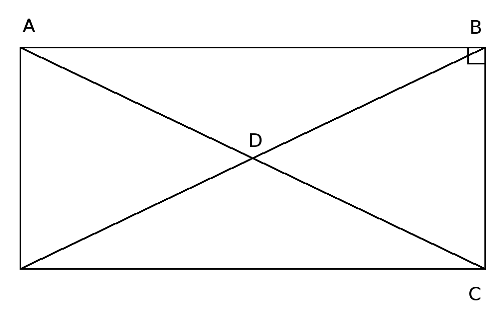Puzzles
The Counterfeit Coin
You have nine coins and a balance scale. One of the coins is lighter than the others. Is it possible to identify it in only two weighings?
Match Point
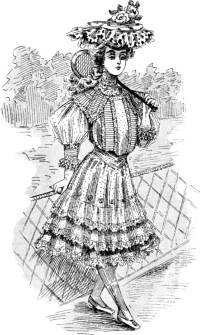
Henrietta wants a yacht. Her parents think she’s too young. Like all rich people, they settle disagreements by playing competitive lawn tennis.
Henrietta must play three singles matches against her parents. If she wins two matches in a row she gets the yacht. Her mother is a better player than her father. Should she play mother-father-mother or father-mother-father?
Black and White
The Last Ball
An urn contains 75 white balls and 150 black ones. A pile of black ones is also available.
The following two-step operation occurs repeatedly. First we withdraw two balls at random from the urn, then:
- If both are black, we put one of them back in the urn and throw the other away.
- If one is black and the other white, we put the white one back and throw the black one away.
- If both are white, we throw both away and put a black ball from the pile into the urn.
Because the urn loses a ball at each step, eventually it will contain a single ball. What color is that ball?
Sideline
Inventing the transformer wasn’t challenge enough for Ottó Bláthy — in his spare time he invented puzzles like this:
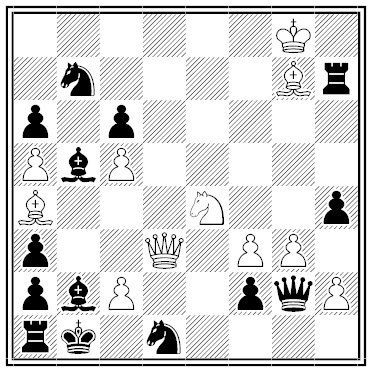
White to self-mate in 342 moves.
Solution:
1.c4+ Kc1 2.Qd2+ Kb1 3.Qxd1+ Bc1 4.Qb3+ Bb2 5.Qd3+ Kc1 6.Qe3+ Kb1 7.Nd2+ Kc1 8.Nf1+ Kb1 9.Qe4+ Kc1 10.Qf4+ Kb1 11.Qf5+ Kc1 12.Qg5+ Kb1 13.Qg6+ Kc1 14.Bh6+ Rxh6 15.Qxh6+ Kb1 16.Qg6+ Kc1 17.Qg5+ Kb1 18.Qf5+ Kc1 19.Qf4+ Kb1 20.Qe4+ Kc1 21.Qe3+ Kb1 22.Nd2+ Kc1 23.Ne4+ Kb1 24.Qd3+ Kc1 25.Qd2+ Kb1 26.Qd1+ Bc1 27.Qd3+ Kb2 28.Qd4+ Kb1 29.Nc3+ Kb2 30.Nxb5+ Kb1 31.Nc3+ Kb2 32.Ne4+ Kb1 33.Qd3+ Kb2 34.Qc3+ Kb1 35.Qb3+ Bb2 36.Qd3+ Kc1 37.Qe3+ Kb1 38.Nd2+ Kc1 39.Nf1+ Kb1 40.Qd3+ Kc1 41.Qd2+ Kb1 42.Qd1+ Bc1 43.Qd3+ Kb2 44.Qd4+ Kb1 45.Qe4+ Kb2 46.Qe5+ Kb1 47.Qf5+ Kb2 48.Qf6+ Kb1 49.Qg6+ Kb2 50.Qg7+ Kb1 51.Qxb7+ Bb2 52.Qh7+ Kc1 53.Qh6+ Kb1 54.Qg6+ Kc1 55.Qg5+ Kb1 56.Qf5+ Kc1 57.Qf4+ Kb1 58.Qe4+ Kc1 59.Qe3+ Kb1 60.Qd3+ Kc1 61.Qd2+ Kb1 62.Qd1+ Bc1 63.g4 Kb2 64.Qd4+ Kb1 65.Qe4+ Kb2 66.Qe5+ Kb1 67.Qf5+ Kb2 68.Qf6+ Kb1 69.Qg6+ Kb2 70.Qg7+ Kb1 71.Qb7+ Bb2 72.Qh7+ Kc1 73.Qh6+ Kb1 74.Qg6+ Kc1 75.Qg5+ Kb1 76.Qf5+ Kc1 77.Qf4+ Kb1 78.Qe4+ Kc1 79.Qe3+ Kb1 80.Qd3+ Kc1 81.Qd2+ Kb1 82.Qd1+ Bc1 83.Kf8 Kb2 84.Qd4+ Kb1 85.Qe4+ Kb2 86.Qe5+ Kb1 87.Qf5+ Kb2 88.Qf6+ Kb1 89.Qg6+ Kb2 90.Qg7+ Kb1 91.Qb7+ Bb2 92.Qh7+ Kc1 93.Qh6+ Kb1 94.Qg6+ Kc1 95.Qg5+ Kb1 96.Qf5+ Kc1 97.Qf4+ Kb1 98.Qe4+ Kc1 99.Qe3+ Kb1 100.Qd3+ Kc1 101.Qd2+ Kb1 102.Qd1+ Bc1 103.Ke8 Kb2 104.Qd4+ Kb1 105.Qe4+ Kb2 106.Qe5+ Kb1 107.Qf5+ Kb2 108.Qf6+ Kb1 109.Qg6+ Kb2 110.Qg7+ Kb1 111.Qb7+ Bb2 112.Qh7+ Kc1 113.Qh6+ Kb1 114.Qg6+ Kc1 115.Qg5+ Kb1 116.Qf5+ Kc1 117.Qf4+ Kb1 118.Qe4+ Kc1 119.Qe3+ Kb1 120.Qd3+ Kc1 121.Qd2+ Kb1 122.Qd1+ Bc1 123.Kd8 Kb2 124.Qd4+ Kb1 125.Qe4+ Kb2 126.Qe5+ Kb1 127.Qf5+ Kb2 128.Qf6+ Kb1 129.Qg6+ Kb2 130.Qg7+ Kb1 131.Qb7+ Bb2 132.Qh7+ Kc1 133.Qh6+ Kb1 134.Qg6+ Kc1 135.Qg5+ Kb1 136.Qf5+ Kc1 137.Qf4+ Kb1 138.Qe4+ Kc1 139.Qe3+ Kb1 140.Qd3+ Kc1 141.Qd2+ Kb1 142.Qd1+ Bc1 143.Kc8 Kb2 144.Qd4+ Kb1 145.Qe4+ Kb2 146.Qe5+ Kb1 147.Qf5+ Kb2 148.Qf6+ Kb1 149.Qg6+ Kb2 150.Qg7+ Kb1 151.Qb7+ Bb2 152.Qh7+ Kc1 153.Qh6+ Kb1 154.Qg6+ Kc1 155.Qg5+ Kb1 156.Qf5+ Kc1 157.Qf4+ Kb1 158.Qe4+ Kc1 159.Qe3+ Kb1 160.Qd3+ Kc1 161.Qd2+ Kb1 162.Qd1+ Bc1 163.Kb8 Kb2 164.Qd4+ Kb1 165.Qe4+ Kb2 166.Qe5+ Kb1 167.Qf5+ Kb2 168.Qf6+ Kb1 169.Qg6+ Kb2 170.Qg7+ Kb1 171.Qb7+ Bb2 172.Qh7+ Kc1 173.Qh6+ Kb1 174.Qg6+ Kc1 175.Qg5+ Kb1 176.Qf5+ Kc1 177.Qf4+ Kb1 178.Qe4+ Kc1 179.Qe3+ Kb1 180.Qd3+ Kc1 181.Qd2+ Kb1 182.Qd1+ Bc1 183.Ka7 Kb2 184.Qd4+ Kb1 185.Qe4+ Kb2 186.Qe5+ Kb1 187.Qf5+ Kb2 188.Qf6+ Kb1 189.Qg6+ Kb2 190.Qg7+ Kb1 191.Qb7+ Bb2 192.Qh7+ Kc1 193.Qh6+ Kb1 194.Qg6+ Kc1 195.Qg5+ Kb1 196.Qf5+ Kc1 197.Qf4+ Kb1 198.Qe4+ Kc1 199.Qe3+ Kb1 200.Qd3+ Kc1 201.Qd2+ Kb1 202.Qd1+ Bc1 203.Kxa6 Kb2 204.Qd4+ Kb1 205.Qe4+ Kb2 206.Qe5+ Kb1 207.Qf5+ Kb2 208.Qf6+ Kb1 209.Qg6+ Kb2 210.Qg7+ Kb1 211.Qb7+ Bb2 212.Qh7+ Kc1 213.Qh6+ Kb1 214.Qg6+ Kc1 215.Qg5+ Kb1 216.Qf5+ Kc1 217.Qf4+ Kb1 218.Qe4+ Kc1 219.Qe3+ Kb1 220.Qd3+ Kc1 221.Qd2+ Kb1 222.Qd1+ Bc1 223.Ka7 Kb2 224.Qd4+ Kb1 225.Qe4+ Kb2 226.Qe5+ Kb1 227.Qf5+ Kb2 228.Qf6+ Kb1 229.Qg6+ Kb2 230.Qg7+ Kb1 231.Qb7+ Bb2 232.Qh7+ Kc1 233.Qh6+ Kb1 234.Qg6+ Kc1 235.Qg5+ Kb1 236.Qf5+ Kc1 237.Qf4+ Kb1 238.Qe4+ Kc1 239.Qe3+ Kb1 240.Qd3+ Kc1 241.Qd2+ Kb1 242.Qd1+ Bc1 243.Kb8 Kb2 244.Qd4+ Kb1 245.Qe4+ Kb2 246.Qe5+ Kb1 247.Qf5+ Kb2 248.Qf6+ Kb1 249.Qg6+ Kb2 250.Qg7+ Kb1 251.Qb7+ Bb2 252.Qh7+ Kc1 253.Qh6+ Kb1 254.Qg6+ Kc1 255.Qg5+ Kb1 256.Qf5+ Kc1 257.Qf4+ Kb1 258.Qe4+ Kc1 259.Qe3+ Kb1 260.Qd3+ Kc1 261.Qd2+ Kb1 262.Qd1+ Bc1 263.a6 Kb2 264.Qd4+ Kb1 265.Qe4+ Kb2 266.Qe5+ Kb1 267.Qf5+ Kb2 268.Qf6+ Kb1 269.Qg6+ Kb2 270.Qg7+ Kb1 271.Qb7+ Bb2 272.Qh7+ Kc1 273.Qh6+ Kb1 274.Qg6+ Kc1 275.Qg5+ Kb1 276.Qf5+ Kc1 277.Qf4+ Kb1 278.Qe4+ Kc1 279.Qe3+ Kb1 280.Qd3+ Kc1 281.Qd2+ Kb1 282.Qd1+ Bc1 283.a7 Kb2 284.Qd4+ Kb1 285.Qe4+ Kb2 286.Qe5+ Kb1 287.Qf5+ Kb2 288.Qf6+ Kb1 289.Qg6+ Kb2 290.Qg7+ Kb1 291.Qb7+ Bb2 292.Qh7+ Kc1 293.Qh6+ Kb1 294.Qg6+ Kc1 295.Qg5+ Kb1 296.Qf5+ Kc1 297.Qf4+ Kb1 298.Qe4+ Kc1 299.Qe3+ Kb1 300.Qd3+ Kc1 301.Qd2+ Kb1 302.Qd1+ Bc1 303.a8=Q Kb2 304.Qd4+ Kb1 305.Qb7+ Bb2 306.Qh7+ Kc1 307.Qh6+ Kb1 308.Qd1+ Bc1 309.Ka7 Kb2 310.Qf6+ Kb1 311.Qb3+ Bb2 312.Qf5+ Kc1 313.Qf4+ Kb1 314.Qd1+ Bc1 315.Ka6 Kb2 316.Qe5+ Kb1 317.Qb3+ Bb2 318.Qe4+ Kc1 319.Qee3+ Kb1 320.Qd1+ Bc1 321.Ka5 Kb2 322.Qed4+ Kb1 323.Kb4 Qg1 324.Qb3+ Bb2 325.Qdd3+ Kc1 326.Qe3+ Kb1 327.Nd2+ Kc1 328.Ne4+ Kb1 329.Qed3+ Kc1 330.Qd2+ Kb1 331.Qdd1+ Qxd1 332.Qxd1+ Bc1 333.Qd3+ Kb2 334.Qd4+ Kb1 335.Nc3+ Kb2 336.Nb5+ Kb1 337.Qd3+ Kb2 338.Qc3+ Kb1 339.Qb3+ Bb2 340.Qd1+ Bc1 341.Nxa3+ Kb2 342.Qd2+ Bxd2#
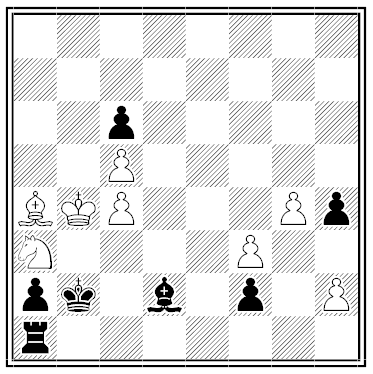
This was typical for Bláthy — in one volume of his compositions, the shortest problem required mate in 30 moves.
Black and White
Perimeter Check
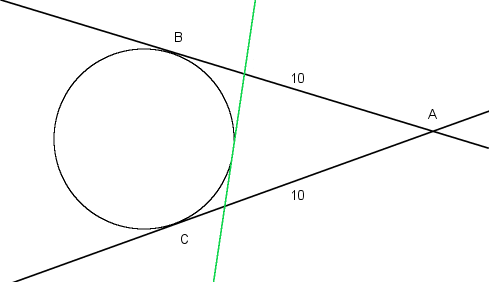
Two lines that intersect at A are tangent to a circle at B and C. AB and AC are both 10. If a third tangent (green) touches the circle somewhere between B and C, what is the perimeter of the triangle formed by the three lines?
Half Measures
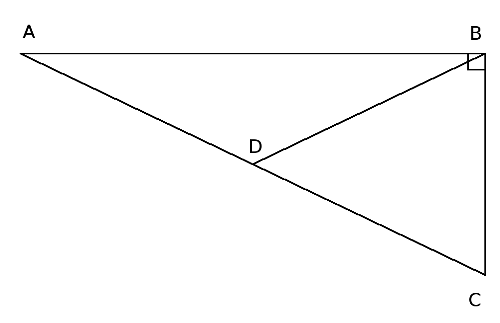
ABC is a right triangle, and D is the midpoint of its hypotenuse.
Prove that BD is half the length of AC.
Times Roamin’
What is the product of this series?
(x – a) (x – b) (x – c) … (x – z)
This yields to an insight, so I’ll withhold the answer.

